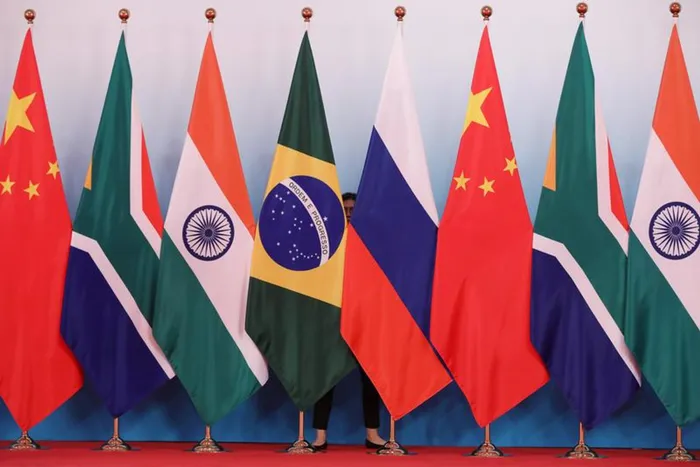BRICS now the voice for South-South co-operation

REUTERS/Wu Hong/Pool - A staff worker stands behind the national flags of Brazil, Russia, China, South Africa and India to tidy the flags before a group photo during the BRICS Summit at the Xiamen International Conference and Exhibition Center in Xiamen, southeastern China's Fujian Province, China.
By Dr Sizo Nkala
South Africa will be hosting the 15th BRICS Summit in August this year. This will be the second time the summit will be hosted on South African shores since 2018. As the BRICS Chair, South Africa will host the BRICS High Level Dialogue and also set the agenda for the summit.
Established in 2009, the BRICS is a group of some of the world’s biggest emerging markets (Brazil, Russia, India, China and South Africa) whose founding mandate was to create or forge an alternative global order to the one dominated by western economies.
These countries felt aggrieved by the limitations imposed on their growth by a western-shaped global security and economic order.
The BRICS latest demonstration of its willingness to resist western hegemony is its refusal to support the US-led campaign for the global isolation of Russia following the country’s military invasion of Ukraine in February 2022. Brazil, China, India and South Africa have steadfastly refused to impose sanctions on Moscow despite coming under US pressure to do so.
In its 15 years of existence, the group has become a platform for voicing and advancing the interests of the Global South countries and promoting South-South co-operation in trade, investment, technology, and security among other areas. Collectively controlling 26% of the global economy and being home to 40% of the global population, BRICS has the economic muscle to push through its agenda.
Its consistent advocacy for a new global order is in line with Africa’s long-term demands for the reform of global institutions such as the International Monetary Fund (IMF), the World Bank, and the United Nations Security Council (UNSC). African leaders have long decried the continent’s under-representation in these institutions which shape the global economic and political trajectory with direct implications on the continent.
As the only African representative in the group, South Africa has vowed to advance continental interests. BRICS’ insistence on South-South cooperation presents an opportunity for Africa to escape its neo-colonial and one-sided relationship with the West which has exacerbated the underdevelopment of the continent. This shift is already happening with China being Africa’s biggest trading partner since 2009. In 2022, trade between China and Africa reached a record $254 billion. The continent has also seen growing trade and investment ties with India, Russia, and Brazil.
South Africa took over the chair of the group at a critical moment in the global geopolitical landscape. Some of the biggest issues the group will have to address during its Summit include a sluggish global economy, global security, the worsening impact of climate change, the growing rift between China and the US – the world’s two biggest economies and of course the transformation of the BRICS itself.
Plans and discussions have been under way for a long time to expand the BRICS group by adding new members. Other key emerging markets such as Saudi Arabia, Argentina, Iran, Senegal and Turkey among others have shown interest in joining the group. During the 2022 Summit, BRICS countries declared their “support promoting discussions among BRICS members on BRICS expansion process. We stress the need to clarify the guiding principles, standards, criteria, and procedures for this expansion process through Sherpas’ channel on the basis of full consultation and consensus.”
While there is no hard and fast criteria yet on how new members are chosen ahead of others, a country’s level of economic development and its geo-strategic potential are likely to be some of the key factors that will be considered.
This places countries like Iran, Saudi Arabia, Argentina and Turkey ahead of the queue due to their immense economic and geopolitical influence in their regions. Argentina and Iran have since submitted formal applications to join the group. Any of these countries’ membership in the BRICS would add considerable strategic value especially in terms of representation in the Global South.
South Africa should use its position as the Chair of the bloc to push for the admission of an African country from the few that have shown interest such as Senegal and Egypt. Having another African country would go a long way in ensuring the inclusion of African interests in the BRICS agenda.
Also high on the agenda of the BRICS Summit will be co-operation on addressing climate change whose impact in the Global South is becoming increasingly devastating. Hundreds of millions of people in the Global South including Africa are suffering from the damage caused by climate change events which have worsened food insecurity, led to massive displacements and destroyed critical infrastructure.
If left unattended, this situation is likely to metamorphose into a deadly security crisis. Hence, it is important that BRICS countries use the upcoming summit to explore measures to address the impact of climate change and also coordinate their positions for this year’s United Nations’ 28th Conference of Parties where climate change is discussed at the global level.
*Dr Sizo Nkala is A Research Fellow at the University of Johannesburg’s Centre for Africa-China Studies.
Related Topics: